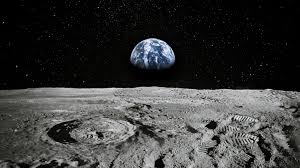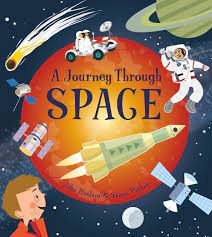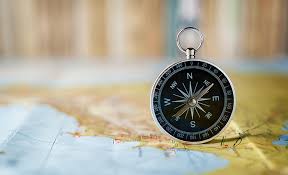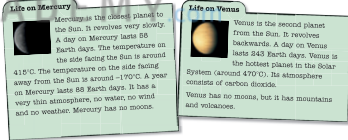Unit 4
Lesson 4 and 5
It will guide you!
1.Before reading:
Look at these pictures. What do they show?
a. b.
b. c.
c. 
The answer: a. Space b. a journey through space c. A compass
2.The key words:
|
The word |
The meaning |
The part of speech |
|
compass |
An instrument containing a magnetized pointer which shows the direction of magnetic north and bearing from it. |
Noun |
|
Zero gravity |
A state or condition in which there is no apparent force of gravity acting on a body. |
Noun |
|
To navigate |
To plan and direct the route or course of a ship, aircraft , or other form of transportation. |
Verb |
|
To launch |
To set (a boat) in motion by pushing it or allowing it to roll into the water. |
Verb |
|
catapult |
Hurl or launch(something) in a specified direction with or as if with a catapult. |
Noun |
|
destination |
The place to which someone or something is going or being set. |
Noun |
|
astronomer |
A person who study space. |
Noun |
3. Each word in a full sentence:
1. He used a compass to fi nd out which way north was.
2. In space, you can fl oat because of zero gravity.
3. To navigate, you should use a good map.
4. When are they going to launch another rocket into space?
5. A catapult can throw things much further than a person ever could.
6. I went on an aeroplane from Beirut. My destination was London.
7. The astronomer spent hours studying the stars all night.
****************************************
4. The main ideas:
1.How to visit the space with a great price.
2.Going to space is'nt impossible mession.
3.Another way for launching on to the spaace by using space catapult.
******************************************
5. Before reading :
READING
Read the article. Can you think of other ways of sending people into space?
|
Taking a trip to space Can you imagine going into space and being able to fl oat in air? Richard Branson’s company is offering short journeys into space for anyone who can afford it. For around $200,000, you could go on the trip! The spaceship will be in two parts and will be able to hold two pilots and six passengers. The plan is for a three-and-a-half-hour fl ight. (1) _____________. Then, it will launch the shuttle over 100 km high and break off. (2) _____________. This is not the only private company that wants to offer short trips into space. (3) _____________. It sounds dangerous, but it is an idea that goes back to Sir Isaac Newton in the 18th Century. Rockets are expensive and need a huge amount of fuel. (4) _____________. However, humans might not survive the force needed to send them to the star. |
4.After reading:
Exercise 3 / Follow the stages in the Reading Strategies box to fi nd the correct sentences (a–d) for each gap (1–4) in the text.
a. After that, passengers can undo their seatbelts and enjoy the feeling of zero gravity in the shuttle.
b. So, instead of being driven by rockets, a spaceship could be thrown into space.
c. First of all, a bigger ship will carry the passengers’ shuttle into the air.
d. Another possible method of launching people into space is a space catapult.
The answer: 1. c; 2. a; 3. d; 4. b
*********************************************************************
VOCABULARY
Exercise 4 /Find these words in the completed text and guess their meaning.
1. seatbelt
a. used for protection in an accident b. used for covering a seat c. used for indicating speed
2. shuttle
a. spaceship b. cover c. fly
3. to afford
a. to become used to new conditions b. to have enough money to pay for something c. to add things together
4. to break off
a. to turn into pieces b. to jump c. to separate
The answer: 1. a; 2. a; 3. b; 4. c
**************************************
Exercise 5 / Read the article again and answer these questions.
1. What will people be able to do in zero gravity?
2. Did Newton think that space travel would be possible one day? Explain your answer.
3. Do you think space travel will become more popular for tourists in the future? Why/Why not?
The answer:
1.People will be able to float in zero gravity.
2. According to Newton, people could be catapulted into space.
3. Students’ own answers.
*****************************************
LISTENING
Exercise 6/ Listen to this passage about Muslim astronomers and their inventions and fi ll in the blanks.
| Do you ever wonder how aeroplanes and ships reach their __________(1) without getting lost? The history of science shows us that it’s more than just luck! ____________(2) studied the universe for a long time and found ways to map the Earth by looking at the stars. Muslim astronomers, like Al Fazari and Al Khawarizmi, changed the way we understand our planet, and others, like Ibn Al Shatir, showed us how to (3)__________ it. Ibn Al Shatir invented both the magnetic ________(4) and the_________ (5) . These inventions allowed people to fi nd their way to Mecca more easily, and even to know the times for (6) ________throughout the day. Today, aeroplanes and ships use the compass for. |
The answer: 1. destinations; 2. Astronomers; 3. navigate; 4. compass; 5. sundial; 6. prayer;
***********************************************************
SPEAKING
Exercise 8:
Read the notes on Venus and Mercury. Choose one planet, and think about whether or not we could live on it. Would it be easy to live there? Remember that to survive, you must breathe the planet’s air and suffer its climate.
Suggested answer
We could not live on Mercury because the temperature is too hot or too cold (depending whereabouts on the planet you are) and there is no water. We could not live on Venus because it is too hot and we couldn’t breathe in the atmosphere.
**************************************************************
Exercise 9/ Sit with those that chose the same planet as you. Discuss your answers.

The answer: Students’ own answers.